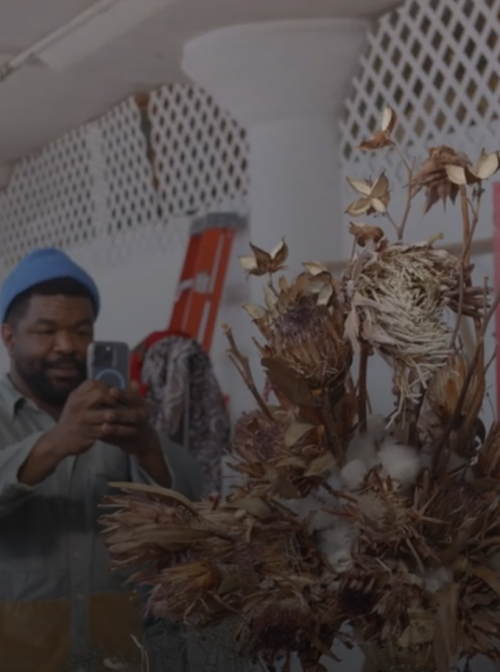As a pastor’s kid raised in Grove Hill, Alabama, John Pendleton holds his parents in great reverence and honored them by naming his floral business, Planks and Pistils, after them. Planks, because he grew up at the elbow of his father working together in their home wood shop. Pistils, to recall the orange rose bush in his mother’s garden, he’d tend and water regularly.
John came to the Chicago to attend Moody Bible Institute but found his calling in more creative spaces building community and working with his hands. A (sort of) divine intervention occurred one night while fashioning some floral arrangements for his wife. He put the design on Instagram and, half joking, asked if anyone wanted flowers.
The response was serious, and a flood of inquiries followed. He started fulfilling orders and began to own the idea of being creative and running a business. Fast forward to the beginning of this year, when John was asked to be the artist behind an activation for a pop-up floral shop in honor of Chicago Bulls point guard and Englewood legend, Derrick Rose.
The one-day flower shop garnered national attention and included an organic installation that John created out of hundreds of roses.
It was not the first time John went viral on the internet. During the pandemic, on Juneteenth, he took to graffiti writer-clandestine like tactics and inspiration from Lewis Miller’s “flower flashes” and adorned the Jean Baptiste Point du Sable bust near the river, downtown on Michigan Ave., with lavish floral wreaths.
It was a feel-good moment, a public art intervention and an opportunity to educate the city about the import and story of the city’s first settler, a Black man from Haiti, who spoke multiple languages, and married an Indigenous woman.
“The will to adorn” is the phrase the great novelist and cultural anthropologist, Zora Neale Hurston applied to the people in her hometown of Eatonville, Florida, noticing their proclivity for mixed media and vibrant colors in the intimacies of their abodes. Hurston went further to discuss the diasporic carrying of this will, linking the braceleted arms of African royalty to the personal affectations of musicians and artists she came to know in Harlem’s renaissance.
The maintenance of this will, might be seen as a form of resistance to the inhumanity of any epoch as well as or sort of defiance of death itself. In the former, the will of folks in the diaspora to maintain a sense of personal and communal beauty and regality, even in struggle and dark times, and the latter, a sort of metaphor like Dylan Thomas to encourage us all to rage against the coming night.
A flower is beautiful for a brief and finite period and John honors and harnesses that beauty as a florist. As a sculptor and installation artist, he utilizes the fragility and anti-fragility of organic materials to create asymmetrical, fluid, art pieces that are public works of majesty. He is currently devising a major solo show this summer at a gallery in Michigan.
Giving flowers is a literal and metaphoric notion of expressing praise and gratitude for someone. John’s designs and art pieces are beginning to garner recognition and receive flowers of their own. But as a practice, artistic and spiritual and religious, John communicates resonating messages of love and adoration by democratizing beauty itself. He believes everyone has the right to the beautiful, every day in their lives and homes and public spaces.
Planks and Pistils currently don’t have any bricks and mortar. He operates online and currently out of pop-up shop in the café, Drip Collective, which itself, is a sort of radically inclusive community center and entrepreneurial space that encourages collaboration from young creatives from all over the city.
The standard of beauty is subjective for sure, but John Pendleton is helping to ensure that people’s access to beauty, is standard. And for that, and much more, he is deserving of flowers of his own.




